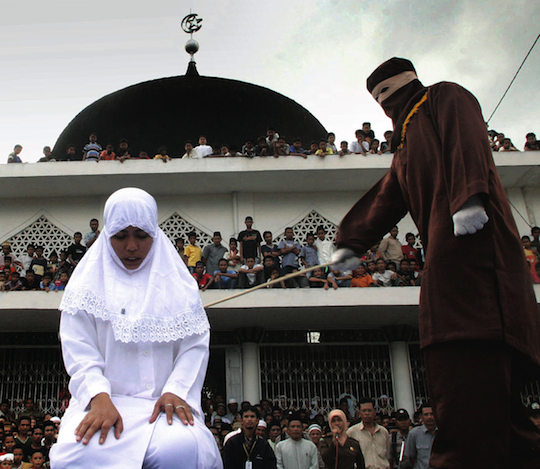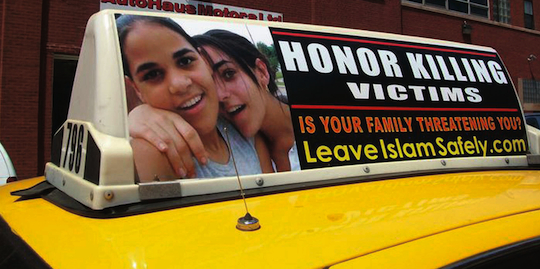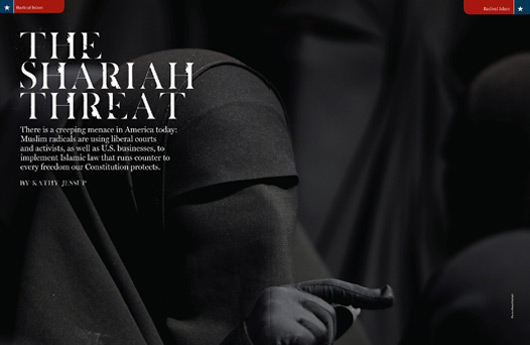
| THINK-ISRAEL |
| HOME | Featured Stories | Subscribe | quote | Background Information | News On The Web | Archive |
A judge refuses a protection order for a woman raped by her Muslim husband, ruling the man's abuse is allowed under Shariah law.
A cartoonist is in hiding after a tongue-in-cheek "Everybody Draw Mohammed Day" promotion earned her a fatwa death order for violating a Shariah edict banning drawing the Muslim prophet's image.
A Shariah-compliant investment fund is camouflaged as a charity and funnels more than $12 million to finance Hamas suicide bombers.
Not exactly shocking in some Muslim countries where strict adherence to centuries-old rules, based on Islamic teachings, shines a spotlight on stonings and beheadings.
But these occurred recently in the United States.
Now "honor killings," publicly funded accommodations for Islamic prayer and billions in Wall Street investments linked to potentially dangerous terror activities are raising political and constitutional questions in America.
Can or should Shariah law co-exist with the Judeo-Christian foundations of U.S. jurisprudence and the Constitution? Will imposition of Islamic-based edicts, enabled by so-called religious tolerance and political correctness, open the door to radical forms of the religion in Western democracies?
A growing number of states are drafting constitutional amendments to prohibit state judges from applying Islamic or international law in deciding cases. But even the 70 percent of voters who passed Oklahoma's measure in November hasn't settled the issue for Sooners.
When the director of the Oklahoma chapter of the Council on American-Islamic Relations (CAIR) challenged the amendment in court, a federal judge granted a preliminary injunction, ruling the amendment could be interpreted to single out Shariah law and discredit Islam, violating the First Amendment.
Shariah (meaning "path" in Arabic) codifies the words, practices and teaching of Islam's Prophet Mohammed, serving as a guide/law for everything from Muslims' family and religious practices to financial transactions.
Several hundred years after the death of Mohammed, the prophet's model living practices were assembled into the hadith, initially melding Islam and local customs. Various hadiths eventually developed into four schools of Sunni thought and one that guides Shiites. Each differs in the degree they draw from the Koran, Islamic thought and community practices.
Shariah identifies five hadd offenses, serious charges resolved by an Islamic judge. They are unlawful sexual intercourse (adultery or sex outside marriage), falsely accusing unlawful sexual intercourse, consuming wine (sometimes all alcohol), theft and highway robbery.
Punishments ordered for hadd crimes by conservative Shariah schools — stonings, executions, amputations and beatings — shock Western sensibilities. However, Ali Mazrui, of the Institute for Global Cultural Studies, says less severe penalties are more typically imposed.
Still, Islam has not uniformly banned so-called "honor killings," genital mutilation, pre-teen marriages, polygamy, and divorce and inheritance rules that undercut the standing of women. Testimony from non-Muslims and even Muslim women is given less weight than that of Muslim men.
The size of a country's Islamic population and its level of religious orthodoxy typically influence the degree to which Shariah law is inculcated in national legal codes.

Conservative Muslim countries including Saudi Arabia, Pakistan, Yemen and Iran declare Islam the official religion and Shariah the source of law. In more secular Muslim countries where Islamists are the minority, Shariah has gradually gained legal legitimacy through local customs. Other countries, including Turkey and Azerbaijan, enforce separation of state and religion, sometimes resulting in political clashes.
Some countries operate a dual system where Shariah is applied to family law, while secular statutes govern criminal cases. For example, Britain introduced Shariah tribunals in 2008 that apply Islamic law to inheritance, marriage and divorce disputes where the parties all agree to the jurisdiction.
In 2009, Dalia Mogahed, an Obama administration adviser on Muslim affairs, told a British television audience that the West misunderstands Shariah law, calling its perceptions of Islamic tenants "oversimplified."
But deaths, abuse and threats involving Muslim women in the United States and Canada have put a Western face on facets of Shariah that had been cloaked in long-standing Middle East practices.
Pakistani-born Muzzammil Hassan was convicted in February for beheading his wife inside the Buffalo, N.Y., television studio the couple had created to promote Islamic cultural understanding. Jurors didn't buy Hassan's story that he suffered spousal abuse and killed his wife in self-defense. Hassan had been served with divorce papers the week before, and his children testified he had been the abuser in the couple's relationship.
In 2008, a New Jersey judge ruled Shariah permitted a Moroccan man to rape his Muslim wife, despite state law making it a crime. The New Jersey Appeals Court overturned that decision and remanded the case, finally allowing the woman to get a restraining order against her husband while she sought a divorce. The appeals court decision said neither Shariah law, giving a husband physical authority over his wife, nor Muslim beliefs on the role of women provided the man an exemption from criminal intent under U.S. statutes.
"[T]he [trial] judge determined to except defendant from the operation of the State's statutes as a result of his religious beliefs," the appeals judges wrote. "In doing so, the judge was mistaken."
Irfan Aleem went to a Pakistani embassy and performed talaq in 2007, exercising Shariah provisions that he said allowed him to divorce his wife Farah by proclaiming his intention three times. Although married several decades earlier in Pakistan, the couple had lived in Maryland for 20 years. Irfan said Shariah allowed Farah no claim on a lucrative pension he would receive from his job with the World Bank.
Maryland judges didn't agree, ruling the Shariah practices were "contrary to public policy of this state." The decision set aside the divorce Irfan had quickly proclaimed and afforded Farah a right to claim marital property in a Maryland divorce.
The deaths of at least 10 women in the United States and Canada have been linked to so-called Islamic "honor killings" in the last seven years.

In 2004, a 14-year-old girl who had been raped in Newfoundland was strangled by her father and brother to "restore the family honor." A 20-year-old daughter of Afghan parents was shot dead in 2006, allegedly because she had moved in with her fiancé before their wedding. The killer was her brother.
In Ontario, a 16-year-old was stabbed to death in 2007 by her father while her mother held her down. The teenager had reportedly fought with her parents over wearing a hijib, a Muslim head covering. In another Canadian case, three teenage girls were drowned in their father's car in 2009. Also found dead was their father's first wife, who relatives say he never divorced. The father, his current wife and the girls' 18-year-old brother were all charged with first-degree murder. Relatives told the media the killings were precipitated by one daughter's dating decisions.
A Muslim father in Texas shot his two teenage daughters, Amina and Sarah Said, to death in January 2008. The murders allegedly were prompted by the girls having "unsanctioned boyfriends." Later that year, a Pakistani man beat his 25-yearold daughter to death in Atlanta, reportedly because she opposed her arranged marriage.
Rifqa Bary, an Ohio teenager, made headlines in 2009 when she fled to Florida and foster care, saying she feared she would be the victim of a Muslim "honor killing" for her decision to convert to Christianity. She continued her religious choice a year later when she turned 18.
In a situation much like the 2008 Muslim assassination order against Danish cartoonist Kurt Westergaard, Seattle cartoonist Molly Norris went into hiding at the FBI's recommendation last spring after her "Everybody Draw Mohammed Day" hit Facebook. A Seattle newspaper said Norris is "essentially wiping away her identity" in reaction to a fatwa urging her killing issued by Anwar al-Awlaki, the radical Muslim cleric connected to the Fort Hood killings, the attempted Christmas Day airline bombing over Detroit and the failed Times Square bombing.
And in February, radical Muslims announced plans to take their demand for American Shariah to the White House, calling for thousands of Islamists to rally on Pennsylvania Avenue March 3. But just hours before the rally was scheduled to begin, its organizer, British Muslim cleric Anjem Choudary, called it off, alleging the cause had been "distorted by the media."
Choudary said the demonstration was merely "postponed until we gather even more Muslims;" no new rally date was announced.
In an online video statement, Choudary said Muslims are obligated to implement Shariah law "immediately, wherever we are in the world," and he said America can reverse "poverty, child abuse, rape, robberies, theft, crime and anarchy-type scenarios" only after the United States embraces the Islamic code for living. In the meantime, Choudary predicted "the dollar will soon lose its status."
"We believe the whole of the world must be under Shariah," Choudary said. "America is not blessed by God. The American dream has become a nightmare."
Other elements of America's Shariah debate are more nuanced. Some, like CBSNews.com's political reporter Brian Montopoli, believe Shariah fears are "overblown at best," and Jeffry Goldberg, The Atlantic's national correspondent, said, "A Martian takeover of New Jersey is more likely than the imposition of a caliphate, or of Muslim law, on America."
Ibrahim Hooper, a spokesman for CAIR, says the enjoined Oklahoma amendment is "an indication of growing anti-Muslim sentiment." Hooper said CAIR has "not found any conflict between what a Muslim needs to do to practice their faith and the Constitution or any other American laws. We are, in fact, relying on the Constitution as our last line of defense."
But conservative Jewish blogger Pamela Geller delivers an aggressive "creeping Shariah" warning: "It's a drip, drip, drip, drip, drip. [In] the mosqueing of the workplace where you're imposing prayer times on union contracts, non-Muslim workers have to lengthen their day. It's wrong."
Consider the political reaction Americans would have seen if these Muslim accommodations had instead been made for Christians:
These public school incidents are not isolated instances.
The Michigan Civil Liberties Union mounted no challenge, saying the foot baths have "no [religious] symbolic value."
"They're in a regular restroom and could be just as useful to a janitor filling up buckets, or someone coming off the basketball court as to Muslim students," said Kary Moss, MCLU director.
That ruling is being appealed.
Conservative author Dick Morris says airplanes may have taken down the Twin Towers, but he predicts Shariah-compliant investing of billions in Western financial markets has the potential to "hijack our institutions, our social policies and ultimately our values in the name of Islamic rule."
Huge oil profits and unease with their own Middle Eastern financial institutions brought Islamic investors to Wall Street in the 1990s in search of special funds that would meet Shariah restrictions. But it was complicated turf for bankers who knew investing but not Shariah.
Enter Sheikh Muhammad Taqi Usmani, a former Pakistani Shariah Appellate Court justice, hired by Dow Jones in 1999 to help establish a process that could attract trillions of investment dollars, generating handsome commissions and agency earnings.
In just a decade, most major U.S. and European investment firms have retained Shariah advisors and paid them millions. Those advisors assure Muslim investors their gains are not connected to interest charges, pork farming, alcohol, pornography or Western defense industries — all activities prohibited by Shariah.
But are those adviser fees — paid to highly placed Muslims — or the billions of dollars in "donations" financial institutions must contribute to specified Islamic "charities" in exchange for an investment's Shariah stamp of approval actually bankrolling deadly extremist activities? Morris followed the money in his 2009 book "Catastrophe," reporting that the U.S. government shut down at least three of the largest charities for financing terrorism.
In a 2008 article titled "Jihad Comes to Wall Street," Alex Alexiev, vice president for research at the Center for Security Policy, called Shariah-compliant investing "an essential part of radical Islam's efforts to insinuate itself into Western societies in order to destroy them from within."
It's also been a bumpy road for some of those hired consultants. Dow Jones severed ties with Usmani after the Center for Security Policy detailed some of Usmani's writings, including one that urged Muslims living in the West to "conduct violent Jihad against the infidels at every opportunity."
The CSP identified another paid Shariah investment advisor, Sheikh Yusuf al-Qaradawi, as a member of the Muslim Brotherhood.
According to Morris, Shariah-compliant funds must donate a small percentage of annual earnings to Islamic charities designated by the advisory boards. Those amounts are not inconsequential. For example, a typical 2.5 percent contribution can amount to billions of dollars.
And if a Shariah-compliant fund is found to have earnings from an outlawed investment activity, the advisors can "purify" those gains by donating more to the approved charities. Morris calls some of the charities "thinly veiled fronts for terrorist organizations such as Hamas and Hezbollah."
Is the lure of trillions of dollars from Muslim portfolios strong enough to open civil law to expanding Shariah influences?
Consider Great Britain where, just a few years ago, then-Prime Minister Gordon Brown said he wanted London to become the world's Islamic-finance capital. Britain's most senior judge subsequently proclaimed the country's Muslims can use "Islamic legal principles" as long as the punishments and divorce rulings comply with English law.
According to Morris, that's already made U.K. Muslims eligible for extra benefits if they have more than one wife, even though polygamy — allowed under Shariah law — is illegal in Britain.
Janet Levy, a prolific writer on Islam and national security, asks why Islam "is sacred, supreme and beyond reproach" in the United States, while other religions are "freely criticized, lampooned in cartoons and denigrated in artwork?" She concludes America is already embracing de facto Shariah law.
"Our uniquely American virtues of tolerance and freedom have worked against us to produce intolerance and oppression," Levy says. "This has led to the stealthy introduction of Shariah law and a climate in which criticisms of Mohammed and Islam are no longer possible without serious repercussions."
Are political correctness and moves to cool the osmosis of the American melting pot fundamentally changing us? Is the arena of ideas — where Americans have historically tested competing beliefs — being shut down so as not to offend?
Recall 1960 when Americans considered it fair game to question Democrat John F. Kennedy about whether he would look first to his Catholicism or to the Constitution in making presidential decisions. Former Massachusetts Republican Gov. Mitt Romney's Mormon faith has come under scrutiny during his political campaigns, sans shouts of profiling.
European nations that have led the West's embrace of Shariah law have recently begun to retreat from their policies of "multiculturalism," suggesting failure to maintain a single national identity has actually cultivated Islamic extremism in countries like Britain.
In a February speech at the Munich Security Conference, British Prime Minister David Cameron argued European "multiculturalism has been a failure" that's fostered Islamic extremism, adding that the West has been "cautious, frankly even fearful" of standing up to it.
"We have even tolerated these segregated communities behaving in ways that run completely counter to our values," Cameron said. "This hands-off tolerance has only served to reinforce the sense that not enough is shared. ... What we see — and what we see in so many European countries — is a process of radicalization."

Something also gets jumbled in the translation when East/West cultures talk about democracy and its relationship with religion.
In 2008 polling conducted by the University of Maryland's Program on International Policy Attitudes, 82 percent of Egyptians said a democratic political system should govern their nation. At the same time, 73 percent said they supported stronger application of Islamic law in Egypt.
Of those, 68 percent said Egypt's government should apply Shariah law to regulate moral behavior; 64 percent supported using traditional punishments like stoning for adulterers; 62 percent want the government to police women's dress; and 59 percent said Shariah rules should be used to provide for Egypt's poor.
So what does this all mean for Shariah in America?
The U.S. Constitution does not assign superiority to a particular religion. However, the idea that liberty is man's God-given — not government-granted — right is a Judeo-Christian principle. America is exceptional because the people — regardless of how or whether they embrace God — allow government limited power.
America does not vest all authority in a theocratic government, where law and even daily life is dictated by a single religious code. But that does not mean the United States is Islamophobic, says New Jersey blogger George Berkin.
"[S]upporting the [Oklahoma amendment] does not make one anti-Islamic. But not being anti-Islamic does not mean that we should not insist that American legal principles — not foreign ones — apply here."
Kathy Jessup is an award-winning, veteran journalist in Michigan whose writing career has focused on government, politics and criminal justice.
This article appeared March 24th, 2011 in Townhall Magazine,
http://www.israelunitycoalition.org/news/?p=6533